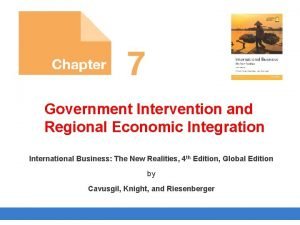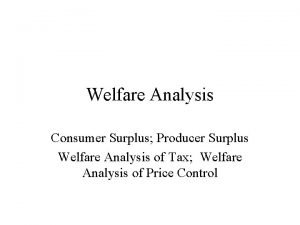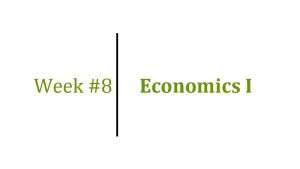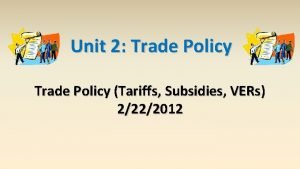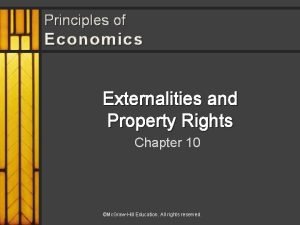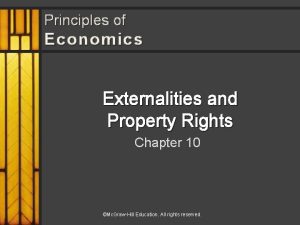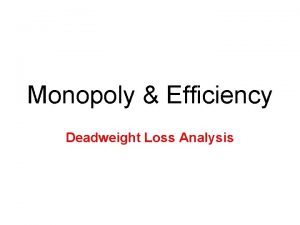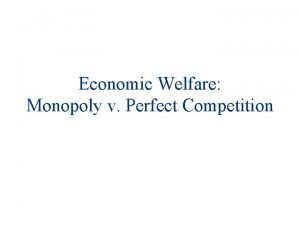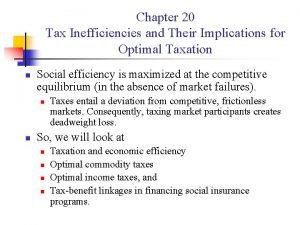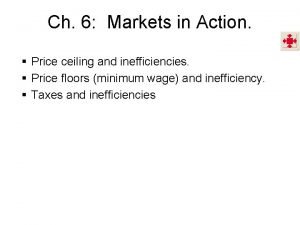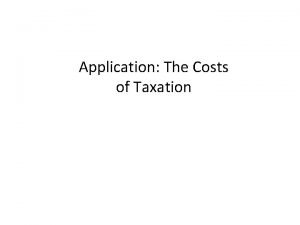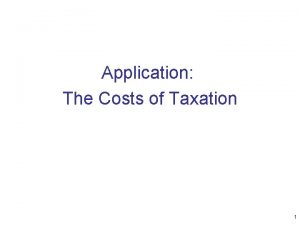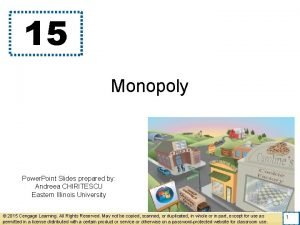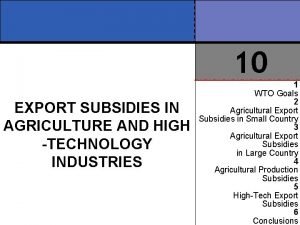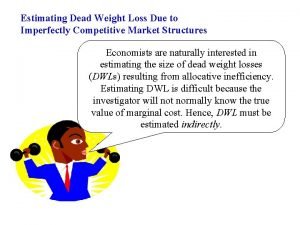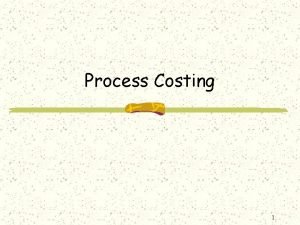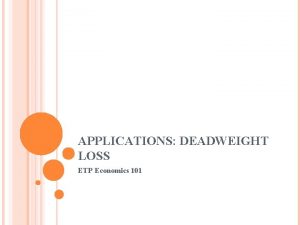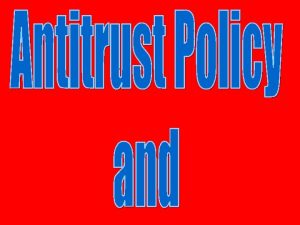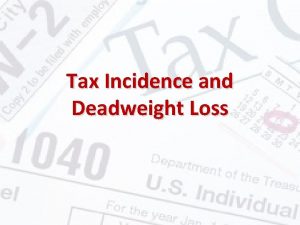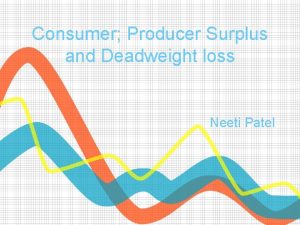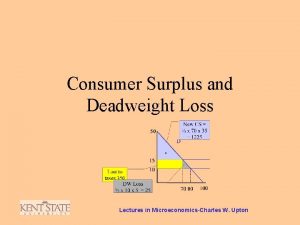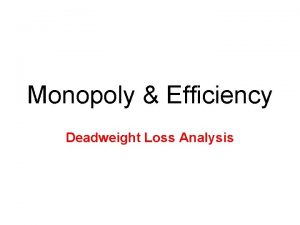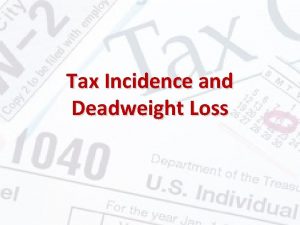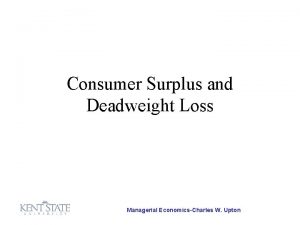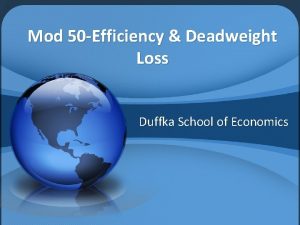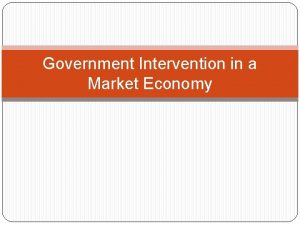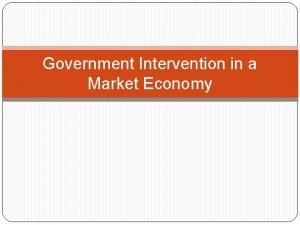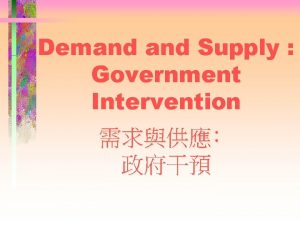The General Rationale for Government Intervention Deadweight Loss



















- Slides: 19



The General Rationale for Government Intervention: Deadweight Loss from Monopoly

Two forms of government intervention • Antitrust Policy – sometimes called competition policy – begin here in this lecture • Price and Entry Regulation of Firms – return to this later in the lecture – sometimes called economic regulation – distinct from social regulation

Sherman Act (1890) • Section 1: Price fixing (ADM case) • Section 2: Persons who “monopolize” or “attempt to monopolize” are “guilty of a felony” – 33 breakups – AT&T is most recent • IBM attempt, Microsoft – predatory pricing • Price below shutdown point and drive other firms from the market, then monopolize

Merger Policy (Clayton Act (1914)) • Federal Trade Commission (FTC) • Antitrust Division of the Department of Justice • Factors to consider in a proposed merger – market power? – Ease of entry?

Herfindahl-Hirschman Index HHI or the “Herf” • Definition: sum of squared market shares – example: a 3 firm industry (30, 40) has HHI = (30)2 + (40)2 = 900 + 1600 = 3400 • Example: challenge if HHI > 1800 and merger would increase HHI by 50 or more – could two of the three firms merge? (60)2 + (40)2 =3600+1600=5200 NO WAY!!!

Example: Intuit - Microsoft proposed merger in 1996 • The DOJ blocked the merger. Why? • The product was “financial software” – Quicken (Intuit) – Money (Microsoft) • market definition (two versions) – DOJ: personal finance check writing programs (70, 22, 8) – Microsoft: should also include pencil and paper

Now let’s consider economic regulation of firms • Both price and entry are regulated • Regulatory agency (CAB, ICC, PUC) sets the price and restricts entry of other firms • Rationale for regulation is that the industry is a natural monopoly (water, wire telephone, electricity distribution) • But what is a natural monopoly?

Natural Monopoly: Decreasing Average Total Costs

There are three ways to regulate the price of a natural monopoly. • But first make sure it is a natural monopoly • Borderline cases like Cable TV? – How many over the air channels are there? – What about satellite dishes? – What about the electricity lines?

(1) Marginal cost pricing • Sounds pretty good, P = MC would mean efficiency and no deadweight loss • But the firm will earn negative economic profits; who would bother to produce? • To see this, just look at a sketch

(2) Average Cost Pricing • This sounds better: – profits are not negative, rather they are zero – and P is not nearly as high as PM though P is greater than MC • But ATC pricing can create bad incentives (corporate jets again, bad management)

(3) Incentive Regulation • Set regulated price several years in advance – for example, ATC plus an inflation factor • Firm gets to keep extra profits (or suffer extra loss) without the regulator immediately changing the regulated price • Thus firm has incentive to keep its costs down

Wrap-Up and Compare P = PM P = MC P = ATC

One other problem: Firm may claim a high cost to the regulators

The deregulation movement • Started in late 1970 s, continued in 1980 s, • Why? Economists were right, many regulated industries not natural monopolies • Examples: price or entry regulations cut – air travel – railroads – telecommunications – trucking – cable TV (re-regulated in 1992)

End of Lecture

 Offensive rationale for government intervention
Offensive rationale for government intervention Price ceiling and deadweight loss
Price ceiling and deadweight loss Welfare loss monopoly
Welfare loss monopoly 2222012
2222012 Deadweight loss with positive externality
Deadweight loss with positive externality Positive externality deadweight loss
Positive externality deadweight loss Deadweight loss in a monopoly
Deadweight loss in a monopoly Health externalities
Health externalities Perfect competition deadweight loss
Perfect competition deadweight loss Deadweight loss formula
Deadweight loss formula Binding price floor
Binding price floor Deadweight loss
Deadweight loss Deadweight loss tax
Deadweight loss tax Deadweight loss of a tariff
Deadweight loss of a tariff Perfectly price discriminating monopoly
Perfectly price discriminating monopoly Subsidy deadweight loss
Subsidy deadweight loss Perfect price discrimination
Perfect price discrimination How to calculate deadweight loss
How to calculate deadweight loss The method of unit costing is adopted by
The method of unit costing is adopted by Government intervention in education
Government intervention in education
